Legal Articles Archive
The below articles are only basic guidelines.
Please contact Scorpion Legal Protection for more information.
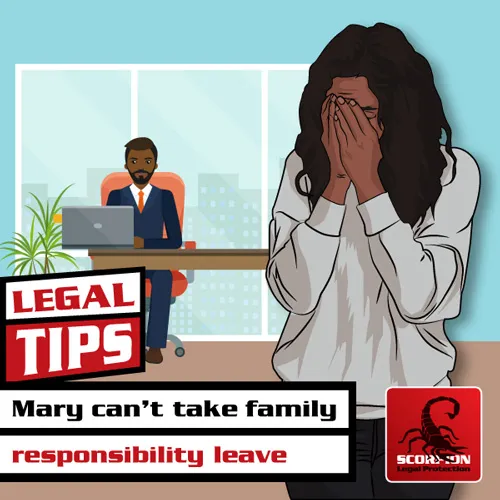
How does family responsibility leave work?
Mary wanted to take family responsibility leave to grieve the passing of a family member, but her employer refused to approve it until he knew which family member it was for. Mary didn’t understand why this was necessary, family is family and this is her family responsibility leave to use or not use. Scorpion Legal Protection discusses family responsibility leave, how it works and why her boss would ask her about it.
Continue reading
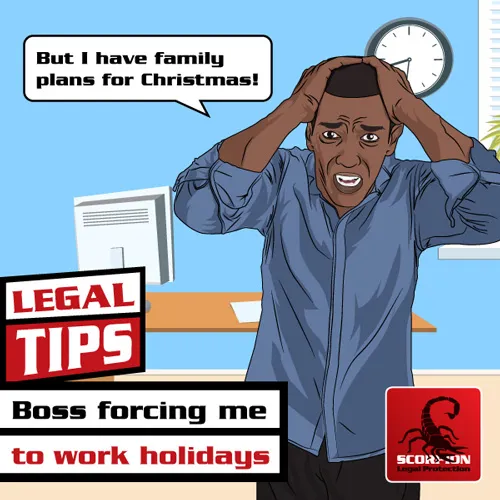
Can my boss force me to work on Christmas?
Mpitse’s* boss says he has to work on Christmas, but he’s already made plans with his family. AZIKHIPHI! That’s not on! When can employers force you to work, and how does annual leave work when it comes to the holiday season?
Continue reading
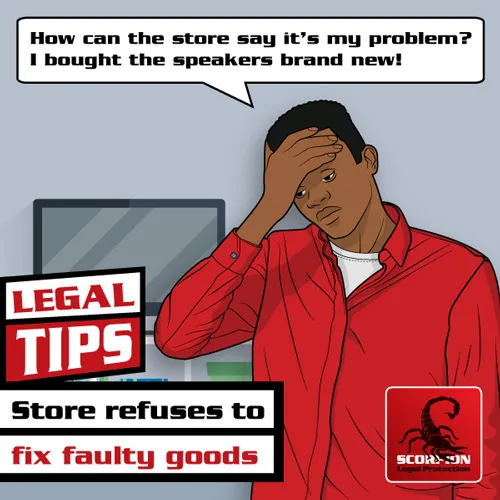
Store refuses to fix faulty goods
Tito was so excited when he bought his family a new home theatre system for the holidays. But just two weeks later, his speakers were no longer working. AZIKHIPHI! That’s not on! He paid good, hard-earned cash for his goods from a reputable store; they must take responsibility and fix it! What legal recourse does Tito have?
Continue reading
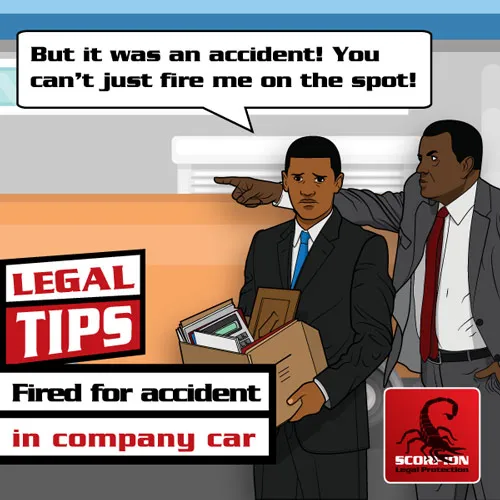
Fired for car accident
When Thulani had a car accident in the company car, his boss fired him on the spot and didn’t pay him his salary. A car accident is serious, but surely an employer can’t just fire an employee? Scorpion Legal Protection answers this question.
Continue reading
TIPS FOR DRAFTING YOUR WILL
Tips for drafting a will:
- Keep your will updated when your life circumstances change, for example a birth or death occurs
- When creating your will, consider who you leave your assets to carefully. Leaving unspecified assets to multiple beneficiaries could lead to issues, for example, fighting over trying to share a house inherited by two people
- If you have children younger than 18, you should appoint someone as their legal guardian in the event of your death
- Create a testamentary trust to protect children younger than 18 who stand to inherent possessions when you die
- Nominate an executor in your will. An executor is the person tasked with the administration of your estate when you die. An executor also assists with the distribution of your assets to the beneficiaries stipulated in your will
- Heirs (the legal inheritors of something) must be clearly identified by full names, surname, relationship and identity number
- Ensure that you understand each clause in the drafted document and that the will accurately reflects your wishes
- You must ensure that each page of the Will, including the last page, is signed by yourself(testator). The Will must also be signed by two competent witnesses. A person will qualify to be a competent witness if s/he is 14 (fourteen) years of age or older.

Continue reading
Date added: December 2018

PAYOUTS ARE TAXED
If you have a pension/provident fund, you have the option to take a part or full lump sum payout when you retire or change jobs (depending on your specific fund). But all lump sum payouts, whether as a result of retirement or not (and from an employer in respect of a severance benefit), are taxed. #StaySmart
*This does not constitute financial advice.
Date added: December 2018

LICENCE FOR EACH FIREARM
A firearm licence only covers one firearm. For every firearm you own, you need to have a separate firearm licence, or you could get into trouble. #StaySmart
Date added: December 2018
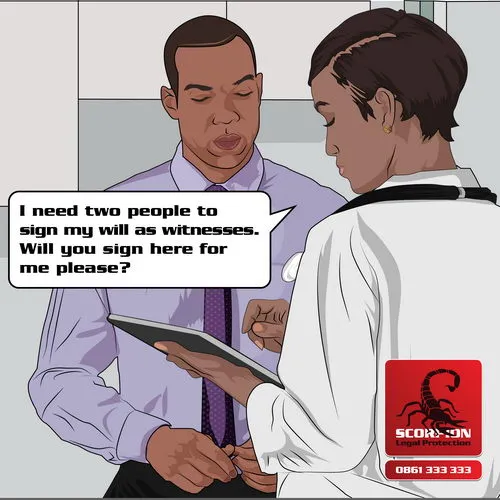
YOUR WILL MUST BE SIGNED BY WITNESSES
When you draw up a will, you should make sure that you and two witnesses sign your will on each page and next to anything that you may have amended. Witnesses should be people who have no interest in the will, and their signatures merely acknowledge that they saw you sign your will. They do not have to know the content of the document. When you sign your will, it is preferable not to ask family members or anyone else who could be an heir or the spouse of an heir to sign as a witness. #StaySmart
Date added: December 2018

Car dealer scams on car extras
When Prince bought a bakkie, he agreed on a price with the second-hand car dealership. But when he went to fetch his car, the dealers said he needed to pay separately for extras on the car – but they were already part of the car!
Continue reading

Stuck with her family’s debt
When Lungi’s aunt asked her to buy a few things for her on Lungi’s store account, she didn’t think twice – umdeni wakho awukhethi. But her aunt has failed to make payment on the debt, and now the debt collectors are after Lungi! What can she do?
Continue reading
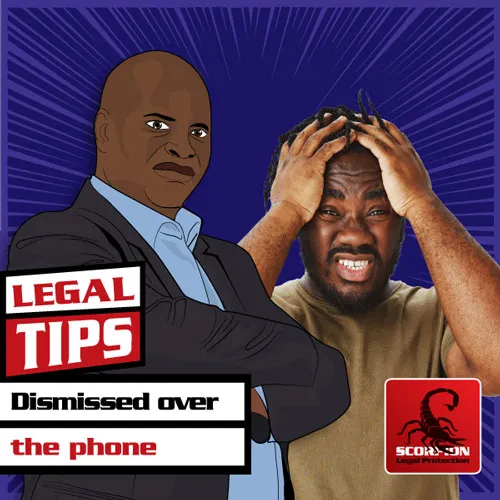
Dismissed over the phone
Sentso’s boss called him one day out of the blue to tell him the company was having financial difficulties, and he should not report to work until further notice. AZIKHIPHI! That’s not on!
Continue reading
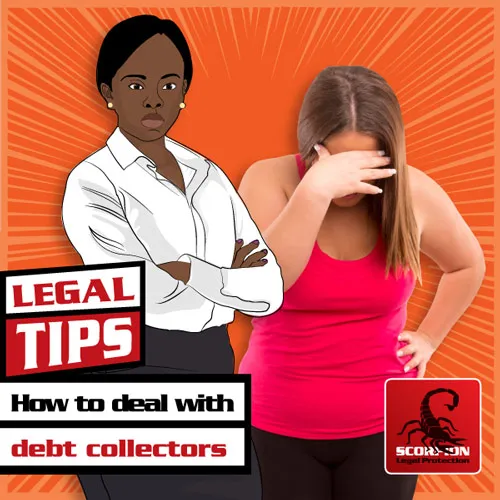
When debt collectors don’t stop
Pearl loves shopping, but got into trouble when she failed to pay her accounts. She owed R1 500. Debt collectors have been debiting money from her account for this debt since 2005 – which means she has paid back far more than what she owed.
Continue reading
THE LAW PROTECTS YOU FROM UNFAIR RETRENCHMENT
Statistics South Africa's latest report for 2018 showed that unemployment rose to 27.2% – that's 6.08 million South Africans sitting without a job. And retrenchments are happening all the time, which is why it's so important to know and understand how the law protects you against unfair treatment from your employer. According to the Labour Relations Act, employers are not allowed to retrench workers without a valid, lawful reason; without consultation and without following a clearly defined process.
If you suspect you've been unfairly retrenched, you can lodge a claim with the CCMA, but you must do this within 30 days of receiving notice of retrenchment from your employer.
Know your rights as a worker so you can strike back legally!

Continue reading
Date added: November 2018
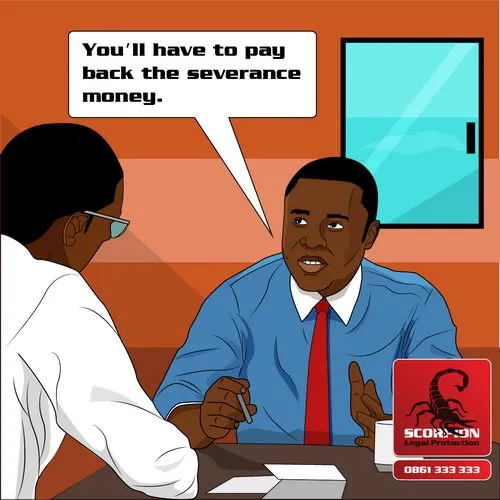
COMPENSATION AFTER WINNING AT CCMA
If you have referred a case of unfair retrenchment to the CCMA and it was found that you were unfairly retrenched and that your employer should reinstate you, you may have to return the severance money paid to you if you have already received payment.
However, this is subject to what both parties may agree on, so these matters should be taken on a case by case basis. In some matters, the employee is reinstated and it may be agreed between the parties that the employee can keep the severance pay. This depends on what kind of compensation the employee is seeking from the unfair retrenchment. In some cases, the employee may not be entitled to compensation due to having received and kept the severance pay. #StaySmart.
Date added: November 2018

LEAVE MUST BE PAID OUT
Your employer cannot refuse to pay out all your leave as part of your severance package should you be retrenched. The Labour Relations Act has clear rules for retrenchment procedures and says that you should get all accumulated leave paid out to you in the case of retrenchment. That means that any leave days that you didn't take should be paid out to you as part of your severance package. #StaySmart
Date added: November 2018

WHAT DOES RETRENCHMENT PAYOUT INCLUDE?
Depending on your employment contract, should you be retrenched, you may also have the right to have the following paid out to you along with your severance package: pro rata payment of bonus, pension and provident fund. It is important to ensure that you get what you are due in the event of retrenchment. #StaySmart
Date added: November 2018

CCMA FOR UNFAIR RETRENCHMENT
If you think your retrenchment was unfair, you can apply to the CCMA for help within 30 days of being retrenched. The CCMA can force the employer to comply with the retrenchment procedure, prevent them from retrenching workers, and order them to award compensation to a worker. #StaySmart
Date added: November 2018

NO RETRENCHMENT WITHOUT VALID REASON
You cannot be retrenched if the company wants to replace you with someone else. If your position is an important part of the operations of the company, they cannot retrench you. The law states that your employer is not allowed to retrench you without reason, without consultation and without following a clearly defined process. If you are retrenched and find out that your job was given to someone else, it qualifies as an unfair dismissal and you can report the case to the CCMA. #StaySmart
Date added: November 2018
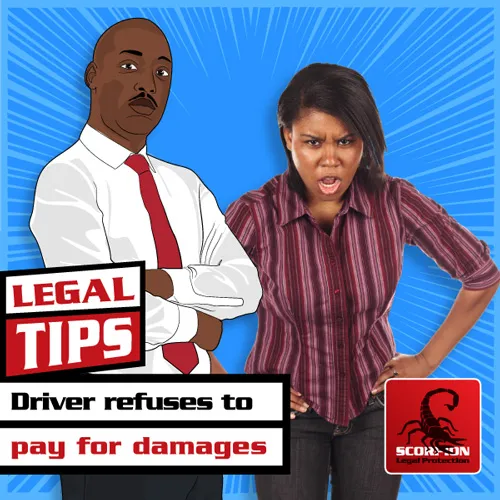
Driver refuses to pay for damages
Ayanda* was worried when she was involved in a car accident recently. Luckily no one got hurt, but her car was damaged. The accident wasn’t her fault – the other driver didn’t brake in time and rode into the back of her car. He admitted the accident was his fault, and said he would pay to have Ayanda’s car fixed.
Continue reading
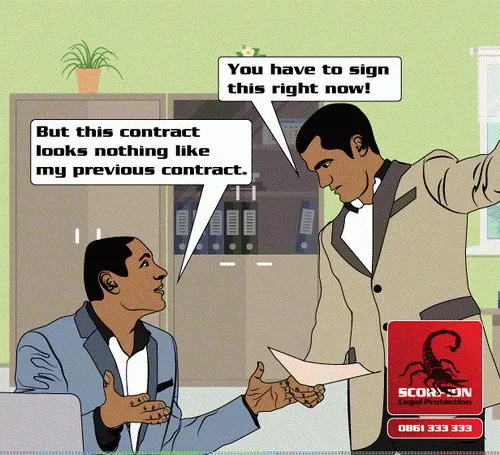
Unilateral changes not allowed
Employers are not allowed to change material terms of your employment contract without talking to you, the employee, about it first. By carrying out unilateral (one-sided) changes, it’s as if your employer has replaced your existing contract with a new one without your knowledge – and that is not allowed. #StaySmart
Continue reading

Rules for salary deductions
Section 34 of the Basic Conditions of Employment Act says that deductions for damage or loss caused by a worker may only be made if:
Continue reading

Minimum leave according to law
According to the Basic Conditions of Employment Act (BCEA), the minimum amount of leave an employer must give workers is 15 working days for every year, or 1.25 days for every month you have worked. #StaySmart
Continue reading

Don't talk on your phone while driving!
Be careful - even if you’re not talking on the phone or messaging while driving, you could still be fined. The National Road Traffic Act expressly prohibits the use of a cellphone and further states that it is illegal to even hold one while driving. #StaySmart
Continue reading

Don't be fooled by dishonest car sales people
Voetstoots doesn't mean dishonest sellers can just get away with selling defective goods – the Consumer Protection Act is there to protect buyers. The law allows for buyers to cancel the contract or sue the seller for a lower selling price if:
Continue reading

Don't give out your tax number
SARS won't give your tax number to anyone other than you, the registered taxpayer, unless the person is your tax practitioner or has Power of Attorney (POA) to conduct your tax affairs. This is to ensure your personal information is kept safe. #StaySmart
Continue reading
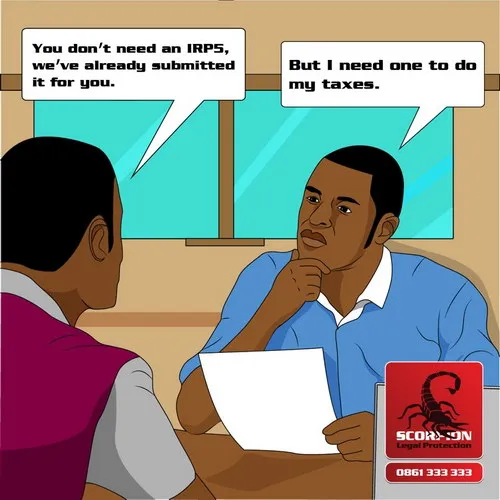
Insist on your IRP5 from your employer
Insist that your employer provides you with your IRP5 so you can compare this to the one submitted to SARS. Your IRP5 describes your employment income and deductions as well as the PAYE tax already paid. Employers have 2 months from May to submit these to SARS and should begin giving them to employees at the beginning of June. If you don’t have it by July, you have a right to demand it. #StaySmart
Continue reading
CHECKLIST BEFORE BUYING/RENTING PROPERTY
Property is a big expense, whether you're buying or renting. Never trust pictures alone, or what someone else says – you should always go and inspect the property thoroughly yourself.
Here's a short checklist of what to look for before signing any contracts:

Continue reading
Date added: October 2018

WATCH OUT FOR CONSTRUCTION SCAM
Builders sometimes approach people who own council houses and persuade them to make alterations by adding extra bedrooms or a garage for a spaza shop. Finance can be obtained by having a mortgage bond registered over the whole property, which is worth more than the alterations. The builders do not tell the owners that if they are unable to repay their bond, they will not only have to pay for the alterations, but can lose their whole house if it's sold by the bank. #StaySmart
This is not financial advice.
Date added: October 2018

TENANTS HAVE THE RIGHT TO PRIVACY
When you rent property, as the tenant, you have the right to privacy, and the landlord may only exercise his/her right of inspection in a reasonable manner after reasonable notice to you. He/she must also have a valid reason for this – to inspect the property, carry out maintenance or repairs, or to show the property to a potential tenant or buyer. In other words, your landlord is not allowed to enter your home unless an arrangement has been made with you, the tenant – a landlord who enters the tenant’s dwelling without permission may be guilty of criminal trespassing. #StaySmart
Date added: October 2018

LANDLORD MUST INVEST YOUR DEPOSIT!
When a tenant pays the landlord a deposit, this money must be invested by the landlord or agent in an interest-bearing account. The landlord can use the deposit (plus the interest) to pay for any amounts the tenant is liable for under the lease, for example missed rent, or damage to the property caused by the tenant.
Whatever is left of the deposit money must be refunded to the tenant no later than 14 days after he/she has vacated the property. If the tenant does not owe anything, the landlord must return all the deposit money, plus its interest, to the tenant within 7 days of the lease expiring. #StaySmart
Date added: October 2018
Labour laws and legal bodies that protect your rights
There are a number of labour laws and legal bodies that protect your rights as a worker. If you are dealing with labour-related legal matters.

Continue reading
Date added: 18 October 2018

Beware of scams and phishing using the SARS brand
Beware of scams and phishing. There is a steady increase in email scams and phishing attacks using the SARS brand. Members of the public are randomly emailed with false “spoofed” emails made to look as if these emails were sent from SARS but are in fact fraudulent emails aimed at luring unsuspecting taxpayers to disclose information such as bank account details.
Continue reading
Be on the lookout for these car scams
A scam can be defined as an illegal plan for making money, especially one that involves tricking people.
In some instances car scams occur when the scam artists portray themselves to be a legitimate company but are actually fraudsters. They trick you into making payment to them in return for the delivery of a vehicle. The vehicle is never delivered and they cannot be contacted on their phone numbers.

Continue reading
Date added: 18 October 2018

New house broken, agents say nothing
When Ruth bought a flat, she expected the place to look the way it did when she first went to view it. But when she got there to move in, someone had broken the door handle off and removed things, leaving the flat in a terrible condition. Legally the house belongs to her now and is her responsibility, but shouldn’t the agents have kept the property safe? Scorpion explains what the law says on situations like these and what you can do.
Continue reading
Basics principles for doing your taxes
Doing your taxes doesn’t have to be hard, even if it's your first time. This is a summary of the basics:

Continue reading
Date added: 18 October 2018
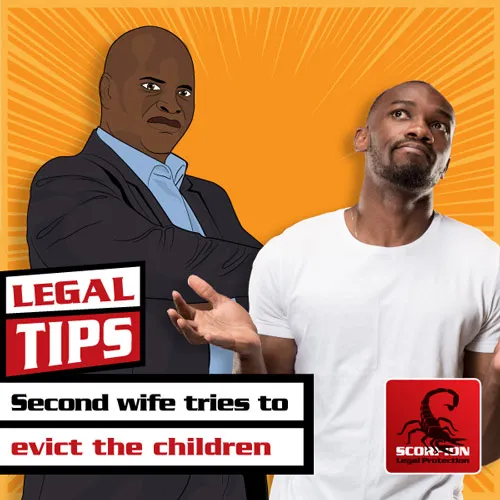
Second wife tries to evict the children
When Mpondo’s father passed on, his father’s second wife threatened to evict them from his RDP house if they didn’t move out. She said it belonged to her, and they needed to get out or else… Can she do this? Scorpion explains what you can do in this kind of situation.
Continue reading
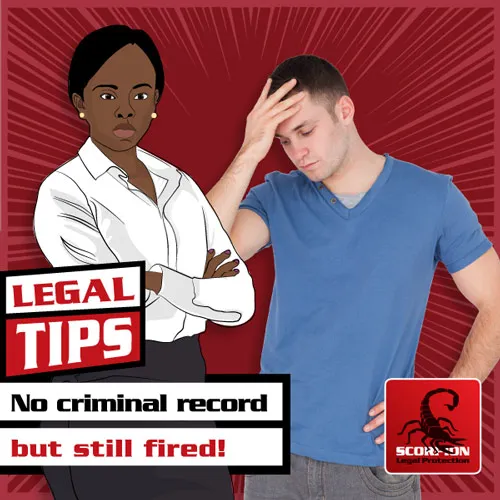
No criminal record but still fired
Even though his criminal record was cleared, Jayden’s boss fired him when he found out that he had a criminal record. Can he do this? Scorpion explains the law on clearing your criminal record and what you can do if you find yourself in this kind of situation.
Continue reading

Insurers tampered with my car
Xolani* was involved in an accident, and had to have his car repaired. Fortunately, he had insurance, so he wasn’t worried. His insurer asked him to send copies of his vehicle documents, which he did. A few days later, they sent someone out to collect the vehicle for an assessment. They kept the vehicle for a week. When Xolani got his car back, he noticed that things were very wrong...
Continue reading
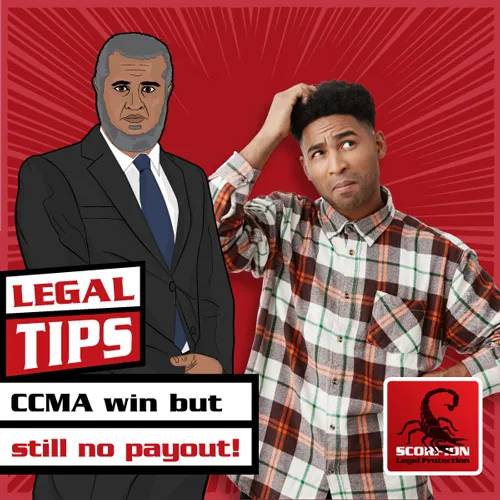
CCMA win, still no payout
TK* and his friend Oarebile* recently got a CCMA award in their favour for a case they lodged against their employer. They had been working at the company on a three-year contract when the company decided to terminate their contracts. They were not given notice of termination. The CCMA found the company guilty and an award was given in their favour, but the company refuses to pay them. What now?!
Continue reading
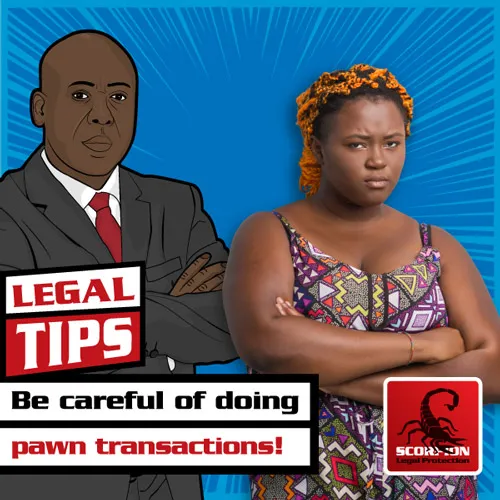
Careful of pawn transations
Masego* and her husband desperately needed cash to get through the month, and decided to loan money from a pawn shop. They borrowed R20 000, which they had to pay back with R6 000 interest. The interest was to be paid in full by 14 August 2018. If they could not pay back the money by the agreed time, the pawn shop could sell their car.
Continue reading

Sold a bum house!
Tshepo* has been looking for a house for her family, so when she found out about an auction and that there would be houses for sale for a very good price, she decided to buy. But when she arrived with all her stuff, ready to move in, she found another family already living there. What now?!
Continue reading
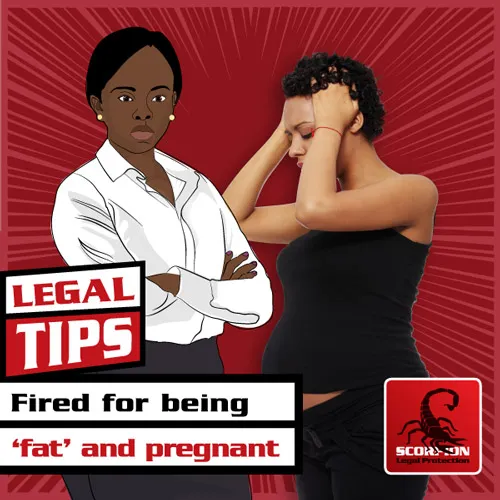
Fired for being pregnant!
Theola has been working as a receptionist for a small company for a couple of years. When she fell pregnant recently, she thought her boss and colleagues would be happy for her. But when she told her boss the news, he got mad and said he couldn’t have a big, fat pregnant woman receiving their customers.
Continue reading

Landlord locked them out illegally!
Phil and Eunice had been renting a small flat for a couple of years. Usually they had no problems paying the rent, and made sure things were always handled on time. But last month, Phil was retrenched unexpectedly, and the couple had financial problems – without Phil’s salary they could barely afford food for the month, they knew they couldn’t afford to pay the rent.
Continue reading

Brother won’t share inheritance
*Nokubonga’s father passed away in 2015, leaving behind his two wives and their children (one child from his first wife, and Nokubonga and her brother from his second wife). When they tried to sort out their father’s estate, Nokubonga’s father’s first wife said she would handle matters on her own, she didn’t want them involved. They never saw a cent of their father’s estate.
Continue reading
It is your socio-economic right
It is your socio-economic right to have shelter and your landlord can't just kick you out, even if you haven't paid your rent. He will have to follow a process of eviction first. This is the process of eviction he must follow:

Continue reading
Date added: 19 July 2018
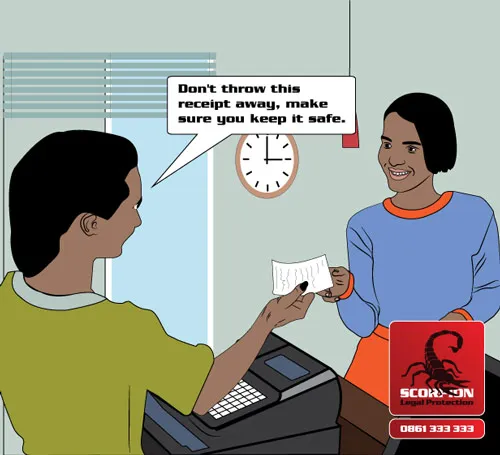
Applying for a social grant is free
Applying for a social grant is free, don't ever be scammed into paying for it! SASSA will give you a receipt when you apply. You must keep this receipt as proof of the date you applied for the grant, especially for grants where the payments are backdated. #StaySmart
Continue reading
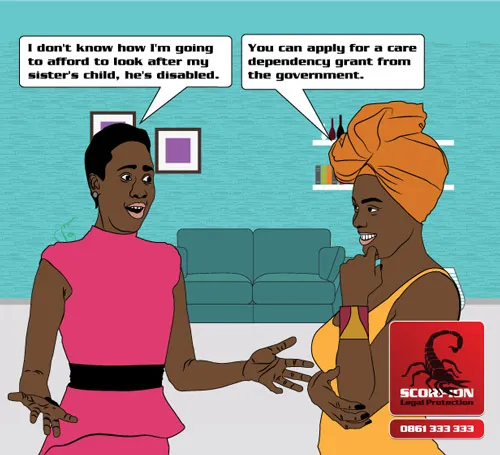
You have a right to social grant
A social grant is financial help from the government. This is for people with low or no income, who can’t work due to injury or disability, or with children. #StaySmart know what kind of grants South Africa offers:
Continue reading

Verbal contracts are not safe
Akira had an interview with a potential employer. They discussed many things, including the salary she would get. Her new employer called to tell her she had gotten the job, and asked her to start the following Monday – they would give her an employment contract to sign then.
Continue reading

Fired without a hearing
Elton works as a cashier at the local butchery. He’s never had any warnings or gotten into trouble at work. One morning, his boss stormed in yelling that someone had stolen some of the store’s meat. The next day, Elton was told that he had been fired.
Continue reading

Look after your children
If a child does not receive the necessary care and protection from their parents or guardians such as basic nutrition, care, shelter, or healthcare, it is considered neglect.
Continue reading
What is customary law?
Customary law in South Africa has been taken into account when it comes to the application of the law to ensure that our cultural diversity is celebrated instead of oppressed. For this purpose, the law recognises the following customary practices:

Continue reading
Date added: 4 July 2018
Whose responsibility is safety at an event?
The Safety at Sports and Recreational Events Act (SASREA) states that the safety and wellbeing of people attending an event lies with the event organisers. Here are some of the responsibilities of the event organisers:

Continue reading
Date added: 4 July 2018
The Consumer Protection Act and returning unsatisfactory items
The Consumer Protection Act (CPA) protects the consumer and the store when it comes to returns. You have the right to return broken goods to the store if the store's policy allows it. Here are other options for dealing with an unwanted gift if you cannot return or exchange it:

Continue reading
Date added: 4 July 2018

Your customary marriage is recognised by law
The Recognition of Customary Marriages Act (RCMA) 120 of 1998 legally recognises customary marriages as valid and legal.
Continue reading
South African courts and the law
Be informed about the law surrounding courts in South Africa. South Africa has a variety of courts that hear different cases:

Continue reading
Date added: 4 July 2018

Register your customary marriage
If you get married under customary law, the marriage is considered valid and legal in terms of the Recognition of Customary Marriages Act (RCMA).
Continue reading

Don't discriminate!
According to the Constitution, we must look at when customary law should be used to make sure that the application thereof is not discriminatory.
Continue reading
Legal documents – don't ignore them!
It is important to get paralegal advice when you get any legal documents, or if you need to submit any legal documents. Legal documents include:

Continue reading
Date added: 4 July 2018
Insurance and the law
Insurance is necessary to protect you, your loved ones and the things you've worked hard to own. But in order to get a payout, you need to make sure you follow the rules, and provide the insurer with everything they need.

Continue reading
Date added: 4 July 2018

Wrongful arrest for peeing
If you are wrongfully arrested for peeing in public, you may have a civil claim against the Minister of Police.
Continue reading

Your rights with police searches
Section 29 of the Criminal Procedure Act, 51 of 1977, states that you can only be searched by an officer who is of the same gender as you.
Continue reading

Public drinking is illegal
If you are caught drunk in, on, or near any road, street, lane, thoroughfare, square, park or market or any other public place.
Continue reading

Returning unwanted gifts
If you want to return an unwanted gift to the store, you need to ensure that your return is in line with the Consumer Protection Act (CPA).
Continue reading

Receiving expensive gifts from clients
Receiving gifts from clients or suppliers is part of working with other people. To cover their employees and themselves, companies must adopt a policy on gifts.
Continue reading

Store return policies
Before you return an unwanted gift, you need to find out what the store policy is. Check if they want the product in its original packaging, if they require proof of purchase and if they accept money-back returns or only exchanges.
Continue reading
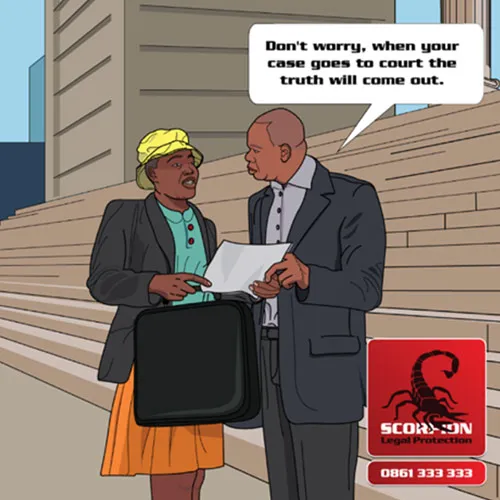
Your rights to a fair trial
If you are accused of a crime, whether you are guilty or not, you have the right to a fair trial. That's the law.
Continue reading

Present your case in any South African language
You can present your case in any of the 11 official South African languages at the Small Claims Court. #StaySmart know your rights!
Continue reading

Cases handled by the Magistrate's Court
If you have a civil matter, such as a dispute over a municipality bill, your case will be heard in the Magistrate's Court.
Continue reading

Understanding warrants of execution
A warrant of execution against immovable property is usually the last resort. It is a long and complicated process.
Continue reading
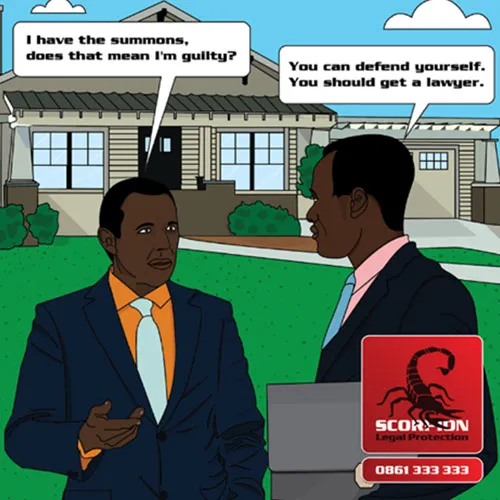
Defend yourself against a summons
You have the right to defend yourself if you get a summons. If you have a good reason or defence, you should get paralegal advice so that you can protect your rights.
Continue reading

Understand your cellphone insurance policy
Make sure that when you get cellphone insurance, you know and understand the policy, you're aware of what they don't cover and what documents they will need if you need to claim. #StaySmart
Continue reading

What to do after a car accident
If you are ever in a car accident, the following tips can help you figure out what to do. #StaySmart
Continue reading

Why your life insurance claim was rejected
There are a number of reasons why your life insurance provider can reject a claim.
Continue reading

RDP houses – don't get scammed!
You can't buy a brand-new RDP house or get 'bumped up' the waiting list by paying a fee. They are given to people who qualify for them as part of a government initiative.
Continue reading

Paid more just for being a man!
After working hard to become senior management in her company, Dikeledi found out that a male colleague (her junior) was earning the same salary as her - for less work and experience. Dikeledi has a Master’s degree and has been working in the industry for more than 10 years. Her colleague only has a Bachelor’s degree and has been in the industry for less than 2 years.
Continue reading

Landlord refuses to fix leak
Zenobi moved in to a flat she was renting, and shortly after discovered that the roof was leaking every time it rained. She called her landlord and told him about the problem, as she was worried the leaking water might damage her furniture eventually. The landlord promised to come fix it, but he never did. Zenobi tried calling him and scheduling meetings at his office, but he was avoiding her.
Continue reading

Boss tried to fire him for taking leave!*
Thato works for a construction company. He is a hard worker – never late for work, always doing more than what is expected of him. So when he applied for leave to go to his mother’s funeral, he didn’t think it would be a problem. His 5 days of leave were approved and he thought everything was fine.
Continue reading

Car shop tries to scam him!
Mr Botsime* took his Golf 6 GTi in for repairs at a reputable workshop. The manager
told him he would have to pay R14 000 for labour, as well as pay for the parts needed
to fix the car. Eish. What could he do, he needed to have his car fixed.
Continue reading
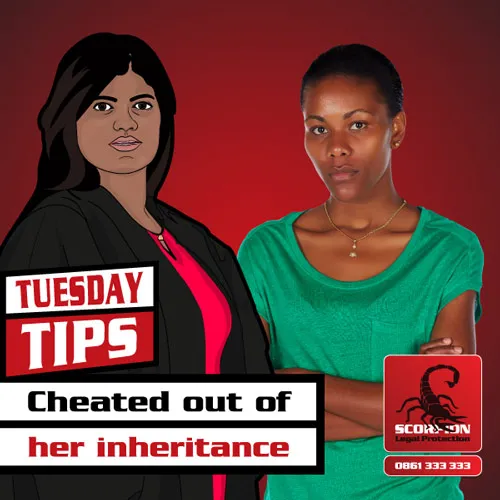
Cheated out of her inheritance
Ntombi’s* father passed away in 1996. She lived in her father’s house with her father, her stepmother and the stepmother’s child. When her father died without a will, her stepmother kicked her out of the house. Later, when her stepmother fell ill, one of her grandchildren asked Ntombi to move back into the house and help look after her.
Continue reading
What rights do our children have?
The Children's Act of 2005 was written to protect children and to provide guidance to parents, guardians, family members, teachers, and social workers. Although the act is mainly about children, it speaks to the whole public as we are all responsible to look after our children.

Continue reading
Date added: 16 December 2017
Who's responsible for injuries at events?
Disclaimers are no longer enough to protect event organisers from liability should an attendee get injured at an event. According to the Safety at Sports and Recreational Events Act (SASREA), the safety and well-being of people attending an event lies with the event organisers.
The responsibilities of the event organisers include:

Continue reading
Date added: 15 December 2017
Your labour rights protected!
The Labour Relations Act and the Basic Conditions of Employment Act protects your rights in the workplace. From unfair labour practice, to unfair dismissal or discrimination, your labour rights are protected!
Under these laws you have the right to:

Continue reading
Date added: 15 December 2017
I'm not registered at the Department of Labour, now what?
It’s important that your employer registers you at the Department of Labour (DOL) for Unemployment Insurance Fund (UIF) and workers’ compensation. If your employer does not do this, it puts you at risk if you were to be dismissed. The Labour Law and the Basic Conditions of Employment Act (BCEA) was written to protect workers in the workplace and to ensure that they are protected against mistreatment and unfair behaviour towards them. If you have a labour issue, the DOL, Labour Court, The Commission for Conciliation, Mediation and Arbitration (CCMA), and other similar institutions can protect you and help you to fight for your rights.
Who can be registered as an employee?
If you work for, or deliver services to another person, regardless of the form of contract, you are considered an employee if one or more of the following applies according to Section 200A of the Labour Relations Act (LRA) and Section 83A of the BCEA:

Continue reading
Date added: 29 May 2017
What to do if you have criminal charges against you.
The South African Criminal Law provides rules and procedures to regulate citizens’ behaviour. If you perform an illegal act, you will be punished for the law that you broke. The Criminal Law doesn’t only regulate citizens’ behaviour, it also protects your rights if you have criminal charges against you, or are guilty of a crime. These rights are explained in the Bill of Rights of the Constitution, as well as the Criminal Procedure Act. A criminal lawyer can protect you and make sure that the sentence fits the crime. If you are guilty of a crime, you will be charged, but with the right defence, the charge can be mitigated or adapted to fit the crime and your existing criminal record, if you have one.
Your rights
Here are some of the rights that you have even if you are guilty:

Continue reading
Date added: 1 April 2017
Insurance basics
Insurance is a necessary and unavoidable fact of life. Instead of thinking of it as a grudge purchase, rather see it as investing in the future of your assets.
When taking out insurance, you need to make sure that you understand all the terms and conditions of the contract, and that you fulfil them. If you are going through the terms and conditions, make sure that you understand every point. If you are unsure, ask. It is the insurer’s responsibility to explain the terms and conditions to you in a way that you can understand.

Continue reading
Date added: 10 November 2016
Don't tolerate professional negligence!
Professional negligence is when a professional person (such as a doctor, builder, architect, or financial advisor) neglects their duty of care. Duty of care refers to the professional person’s legal obligation to ensure the safety or wellbeing of others.

Continue reading
Date added: 10 November 2016
Don't get cheated with your tax return!
Paying tax can seem like an unnecessary burden to many. Have you ever wondered why you need to give a percentage of your hard-earned money to the government? The answer is really simple: South Africa needs the contributions of its citizens to provide much-needed services such as transport, healthcare, education, welfare, and even our national security. Without the revenue generated by income tax, the government won’t be able to provide these services to the citizens of the republic.

Continue reading
Date added: 10 November 2016
Don't get mistreated in the workplace!
If your employer isn’t treating you, as employee, right, rest assured that you have the Labour Law on your side! South Africa’s Labour Law has been formulated to ensure fair outcomes for both employees and employers. But how familiar are you with your rights as an employee? Let’s look at some of the common issues employees face regarding leave entitlement and unfair discrimination.

Continue reading
Date added: 10 November 2016
Know your consumer rights
As a consumer in South Africa, your rights are protected by the South African Consumer Protection Act (CPA), No 68 of 2008. According to the CPA, you are given the following rights:

Continue reading
Date added: 10 November 2016
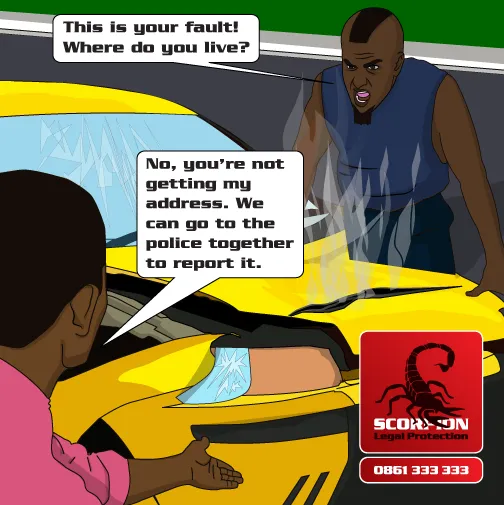
Keep your personal info personal!
If you’ve been involved in a car accident, do not give out your home address to anyone. This protects you from possible intimidation. #StaySmart
Date added: 1 October 2016

Check your wipers!
Your claim may be rejected if you are involved in an accident and your insurance company finds out that your car wasn’t roadworthy. Even worn wipers can jeopardise your claim. Make sure your car is roadworthy at all times! #StaySmart
Date added: 1 October 2016

Keep your car roadworthy!
Your claim can be rejected if your insurer finds that your car isn’t roadworthy! Make sure your car is in a roadworthy condition at all times. #StaySmart
Date added: 1 October 2016

NO to harassment!
Don’t accept workplace harassment! If you’ve used all the internal company procedures available to you as an employee, lodge a complaint with the CCMA. #StaySmart
Date added: 1 September 2016

The Outstanding Amounts Scam
Scammers who pretend to be SARS officials, go from house to house demanding payment for “outstanding amounts”. Never give cash to anyone claiming to be from SARS! All moneys need to be paid directly into SARS’ bank account. Remember: SARS doesn’t usually send agents to individuals or businesses to collect outstanding money.
Date added: 1 August 2016

Don't fall for the SARS scam!
Don’t be fooled by people pretending to be SARS officials! They will try anything to get your personal information – SMSs, emails, calls, and even face-to-face visits. Never give out any information. #StaySmart
Date added: 1 August 2016

The Fake Gift Card Scam
Scammers are sending emails around containing links to fake gift cards in the hopes of stealing your personal information. Think before you click! If the offer sounds too good to be true, it probably is.
Date added: 1 July 2016
The RAF in short
The Road Accident Fund (RAF) is there to compensate road users that have been injured, or their families if the accident resulted in death. This fund has been established to benefit all South Africans who use our road, and should be respected and protected by all.
If you know of any fraudulent activity, you should report it. By not reporting fraudulent activity, the fund loses money that could have been given to people who have suffered legitimate loss.
As a Scorpion policyholder, we can assist you in claiming from the RAF if the need ever arise.

Continue reading
Date added: 1 July 2016

The Fraudulent RAF Claims Scam
Can you believe that there are people who put in fraudulent claims to the RAF, essentially stealing money from those who actually need it? If you know of any suspicious RAF-related activity, you can call the toll-free tip-off line - 0800 005 919.
Date added: 1 July 2016

The RAF Claims Scam
Scammers pretending to be from the RAF are contacting members of the public, asking them for their information so they can deposit compensation into their accounts. Never give out any personal information unless you are absolutely sure you are dealing with legitimate officials. When in doubt, hang up and call the RAF directly.
Date added: 1 July 2016
The dangers of social media
Although social media has been around for quite some time, many people still don't realise the potential dangers that may lurk between the status updates and photo shares.

Continue reading
Date added: 25 May 2016

The infected video scam
Many scammers out there are just trying to make others' lives miserable. Recently, scammers on Facebook tagged users in a video. When the user would click on the link, the video would start playing, but then stop to ask the viewer to install a fake Flash player. This link will then load malware onto your computer. The lesson here is, as always: CHECK before you CLICK!
Date added: 25 May 2016
All you need to know about retrenchments
It is possible that you, or someone you know, will face retrenchment sometime in your life. A retrenchment is a no-fault dismissal, in other words, it is not the worker’s fault that they are being dismissed. Retrenchments often occur when the employer makes operational changes such as downsizing.
When retrenched, you will be offered compensation. This is called severance pay, and is calculated at a minimum of one week’s salary for every completed year of work. In other words: if you’ve worked for one year and eight months, you will only receive one week’s worth of pay.

Continue reading
Date added: 6 April 2016
Noisy Neighbour
You home is where you go to get away from the world. That is why the law ensures that you can get maximum enjoyment from your property – provided it doesn’t encroach on anyone else’s rights.
There are a various laws that deal with all the possible issues that can cause problems between neighbours. For instance – if a neighbour is making a lot of noise on a regular basis (Noise Nuisance), it is a different case than if he makes a racket once-off (Disturbing Noise). As they say, good fences make good neighbours, so be careful not to encroach onto your neighbour’s property. Similarly, if a branch from your neighbour’s tree hangs into your yard, and it is infringing on the use of your property, or causing damage to your property, you may ask him to cut it down first. If he unreasonably refuses to do so, you may cut off the offending branch of the tree yourself. Just make sure you don’t damage the tree in such a way that it can fall over or die.
Although there are many laws governing neighbours, it all comes down to being considerate of those who live around you.

Continue reading
Date added: 31 March 2016
Barking dogs driving you mad?
The sensible thing to do is to chat to your neighbour, over a cup of tea, and explain that the dog is preventing your baby from sleeping (or whatever) and ask him or her to do the neighbourly thing. One solution (if the neighbour works all day and the dog is bored or afraid) is to fit a cold air spray bark collar. All vets sell these devices and they are not at all cruel. Perhaps the dog needs to see an animal behaviourist? He or she will see why the dog barks excessively (lack of exercise, lack of stimulation, separation anxiety, protecting territory, etc.) and recommend a solution.
If that does not help or if the neighbour is indifferent or defensive (and refuses to make the nuisance go away) you should report the matter to the authorities (the local authority and, perhaps the SPCA) and, that failing, contact your lawyer, who will have to send a threatening letter or even go to court for an interdict.
Disciplinary procedures vary from district to district. If you go the legal route, you will start a feud, so, wherever possible, try and settle matters amicably.
In the Cape, owners may not keep any dog that barks for more than six minutes in any hour or more than three minutes in any half hour. An official may order the owner to take necessary steps to stop the disturbance and owners are required to keep the dog under proper control. Gauteng hasn’t gone that far.
The SA Noise Control Regulations provide that no person shall:
- make, produce or cause a disturbing noise, or allow it to be made, produced or caused by any person, animal, machine, device or apparatus or any combination thereof;
- operate or play, or allow to be operated or played, a radio, television set, drums, musical instrument, sound amplifier, loudspeaker system or similar device producing, reproducing or amplifying sound so as to cause a noise nuisance;
- offer any article for sale by shouting, ringing a bell or making other sounds or by allowing shouting, the ringing of a bell or the making of other sounds in a manner which may cause a noise nuisance;
- allow an animal owned or controlled by him or her to cause a noise nuisance.
If a noise emanating from a building, premises, etc., is a disturbing noise or noise nuisance, the authorities may instruct in writing the person causing such noise to discontinue or cause to be discontinued such noise within a period stipulated in the instruction. Failing response (in the case of e.g. power tools, musical instruments or animal) the instrument, equipment or animal can be confiscated, or impounded.
Any person who contravenes or fails to comply with a written notice shall be guilty of an offence and liable on conviction to a fine not exceeding R20 000 or to imprisonment for a period not exceeding two years, or to both such fine and such imprisonment. In the case of confiscated items, the court may declare any vehicle, power tool, musical instrument or equipment, or animal forfeit to the local authority.
Written by Roy Bregman
www.roylaw.co.za
Date: 17 June 2014

Continue reading
Date added: 30 March 2016

The false rental scam
There are scammers out there that "rent out" properties that are not theirs to let, or do not even exist! Never pay a deposit if you haven't seen the property in question, or are sure that the person is indeed the true landlord. If you are still unsure of his/her legitimacy, you can ask to see the utilities bill for the property.
Date added: 12 February 2016
Road Accidents
If you are ever involved in an accident, it is important that you get as much information as possible from all parties involved as well as witnesses. This includes:
- full names;
- ID numbers;
- addresses;
- telephone details; and
- vehicle registration numbers.
Also make sure to get:
- descriptions of the vehicles; and
- details of tow truck personnel.
If possible, take photographs of the following:
- the scene of the accident, from all angles;
- the surrounding area;
- your injuries; and
- any damage to property.
Draw a sketch plan of the scene and make sure that it contains a fixed point so that it can easily be traced.

Continue reading
Date added: 18 January 2016

The tow truck scheme
Never allow anyone you do not know to call your insurance company on your behalf. There are some unethical towing companies that pretend to get approval from your insurer, potentially leaving you with a hefty bill for towing fees and storage!
Date added: 11 December 2015

The Ponzi scheme
If an investment opportunity offers very high return on investments, is never widely advertised, is not authorised by or registered with financial service providers, and you have to recruit other people to get return on your investment, it is most likely a Ponzi scheme. Stay away!
Date added: 11 November 2015
Be cautious of Investment Scams
- Be careful of people or places promising you big pay outs for low risk investments. This could be a sign it is a scam.
- Take time before committing to an investment. If you are asked to respond immediately to a “once in a lifetime offer”, then they could be pressurising you on purpose so you do not have time to find out it is a scam. STOP.
- Do not invest in something you do not understand and never sign contracts or documents you have not read carefully. Watch out for poor grammar and spelling this is a sign it is a scam.
- Research the company that is calling you. Get their contact details, physical address and try and visit them. A website is not necessarily proof that the company exists and is legitimate.
- Tell your children, friends, and neighbours, and ask their opinion on the investment you want to make. They might also be able to warn you if they know it is a scam.
- Keep your private information private. Do not say too much information about yourself or your life situation over the phone. Do not respond to emails, SMSs or phone calls requesting your personal information such as bank details and ID number.
- Do not respond to emails or SMSs telling you that you have won a lottery or that you’ve inherited millions, and NEVER click on a link asking you to verify account details.

Continue reading
Date added: 6 November 2015

Unlawful deduction on your bank account
If money is being taken from your account, and you have not signed an agreement and consented to someone making those deductions, you should contact your bank immediately to stop the deductions. Scorpion policyholders can talk to us for assistance.
Date added: 14 October 2015

The UIF benefit scam
The UIF Benefit Scam: Beware of companies who claim that they can get unpaid money owed to you from the UIF. They will charge you a fee for their services, and simply disappear! Dealing with the UIF is always free, and if you need assistance, you can contact Scorpion.
Date added: 5 October 2015
Invest your money wisely
You work hard for your money – make sure that you invest it wisely! There are many people who claim that they can help make you lots of money in a very short time, but not everyone can be trusted.
Here are five warning signs of an investment scam:
- Promises of quick profits.
- Offers to share “inside” information.
- Salesmen who pressure you to invest before you’ve had the chance to investigate their claims.
- A salesman who discusses a company you’ve never heard of before. Before you invest, check whether or not the company in question is on the Financial Services Board’s fraudulent company alert list by visiting www.fsb.co.za
- The use of an alias. If someone wants to hide their true identity you need to question the legitimacy of their claims.

Continue reading
Date added: 5 October 2015

SARS fake SMS alert!
If you get an SMS asking for your ID and tax number to avoid payment delays, DO NOT SEND IT! It's just another way scammers try to steal your personal information.
Date added: 9 August 2015

The Fake Audit
If you receive a letter from SARS claiming that you are being audited or if someone claiming to be an auditor visits you, do not give any information without first confirming their identity. Rather call the SARS contact centre on 0800 7277 to be sure.
Date added: 8 August 2015
Law surrounding Pregnancy
This month we are looking at the law surrounding pregnancy in the work place. When finding out that you are expecting a bundle of joy, the last thing you should worry about is how it will affect your work life. Luckily, the Basic Conditions of Employment Act provides for women to grow their families while retaining their jobs. As a female employee, you are entitled to at least four consecutive months of maternity leave. You may take your leave at any time from four weeks before the expected date of birth, or from the date advised by your medical practitioner or midwife to ensure the safety of you and your unborn child. You are not allowed to work for six weeks after giving birth unless your doctor or midwife certifies that you are fit to do so. Should you suffer a miscarriage in your third trimester, or if your child is stillborn, you are still entitled to six weeks’ leave following the birth. Keep an eye on the Scorpion Facebook page for more information on your rights during and after pregnancy!

Continue reading
Date added: 7 August 2015

SARS Information SMS
SARS will never send you an e-mail or SMS asking you to provide personal, tax, banking and e-Filing information. Even if the e-mail or SMS looks official and says it is from SARS:
(1) Do not open or respond.
(2) Delete immediately.
Date added: 7 August 2015
Do you need to submit a tax return?
It’s nearly tax season again! If you earn less than R250 000 per year (or R20 833 per month) from one employer before tax, you don’t have any other income, and you don’t have to claim expenses such as medical aid or retirement annuities, you don’t need to file a return. If you don’t fall into this category, you need to register as a taxpayer and submit a tax return.
Submitting a tax return can seem very intimidating, but luckily Scorpion is there to help our members. We can submit your tax returns for you, as well as help ensure that you are billed correctly. If you have any trouble with your tax return, you can report the issue to Scorpion’s Tax Help Desk who will help you resolve it.
As always, be very careful when giving out your personal details to anyone. There are many tricksters who will do anything to get hold of your money. They love sending mails and SMSs stating that SARS has made a payment to your bank account. Do not click on the links in these communications! Rather type SARS’ verified address (www.sars.gov.za) straight into your browser or call them directly on 0800 00 7277 to find out if you have in fact been paid.

Continue reading
Date added: June 2015
Contract basics
Legally speaking, a contract is an agreement between two or more parties. This agreement has to be entered into voluntarily. A contract lists all the obligations that each party expects the other to fulfil.
A contract can be entered into either through a written document or verbally. When you agree on something, even if nothing is written down, this is seen as a contract, and you can be held legally responsible to uphold your end of the bargain.
It is very important that you do not enter into a contract without knowing exactly what you are agreeing to. If you don’t understand something that is included in a contract, do not sign it. Rather ask a legal counsellor to explain it to you. As a policyholder, you may contact Scorpion to answer any questions you might have around contracts.

Continue reading
Date added: 1 June 2015
How to claim from the RAF
The Road Accident Fund (RAF) is a government body set up to compensate people who have been injured due to negligent driving on the road, or the dependents of those people if they were killed. For instance, if you are crossing the road at a pedestrian crossing while the light is green for you and someone hits you with his or her car, you may put in a claim at the RAF. To claim, you will need the following:
- A completed RAF claim form (RAF 1).
- An affidavit with all the details of the accident, including the names of the people involved and time and date it happened.
- Statements of witnesses, if there were any.
- Police reports.
- Hospital and medical reports.
- Documents in support of amounts claimed.
The RAF will then determine if the claim is valid by looking at the seriousness of your injuries, the details of the accident, whether it was submitted on time, etc.
Making a false claim to the RAF is fraud, and can result in imprisonment. If you know of any suspicious RAF-related activities, you can call the Toll-free Tip-off Line: 0800 00 5919.

Continue reading
Date added: May 2015

The Pyramid Scheme
Everybody wants to get rich – and quick! But be careful you don't fall for a pyramid scheme. If your income is dependent on how many people you recruit, and not on how much product you sell, it could be a pyramid scheme. Do your homework before putting any money on the table!
Date added: 13 April 2015
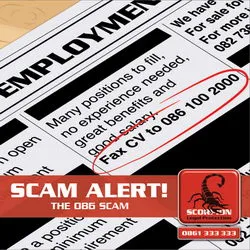
The 086 Scam
While looking for work, make sure you keep your eyes open for scammers! If a recruiter or potential employer asks you to fax your CV to a number starting with 086, be careful. Faxing something to one of these numbers will likely cost you a lot of money, and make the scammers rich in the process. Rather ask if you can email your documents. A legitimate employer will give you that option.
Date added: 6 April 2015

The Loan scam
If you ever get a call from an unknown source telling you that you've been pre-approved for a loan, hang up! This is just another way for tricksters to get their hands on your hard-earned cash. No reputable lender will approve you for a loan without first doing a full background check.
Date added: 5 April 2015
Children’s right to education
Did you know that children have special rights when it comes to access to education? According to The SA Schools Act 84 of 1996, learners in public schools have the following rights:
- No learner may be refused admission to a public school on the grounds that his or her parent(s) is unable to pay or has not paid the school fees.
- In addition, no learner may be deprived of his or her right to participate in all aspects of the programme of a public school, despite the non-payment of school fees by his or her parent and may not be victimised in any manner including, but not limited to, the following conduct:
(a) suspension from classes;
(b) verbal or non-verbal abuse;
(c) denial of access to cultural, sporting, social activities of the school or the nutritional program; and
(d) denial of a school report or transfer certificate.
If you can’t afford school fees, you can apply to the School Governing Body for exemption from paying school fees. There are also no-fee schools where learners can attend classes for free.
Private schools are different and don’t have to adhere to the above. However, it’s worthwhile keeping in mind that they cannot withhold reports or transfer certificates, but they are allowed to cancel the contract with the parents if the school fees are in arrears.
Educating yourself on the law can help you educate our future.

Continue reading
Date added: 26 March 2015

The Pressure Purchase
Do not allow anyone to pressure you into buying something. Tricksters often use lies like "This is the last one left" or "There are other people who are interested" to force you to make a quick decision. If you aren't 100% sure of what you are buying or don't trust the person you are buying it from, rather walk away.
Date added: 4 March 2015
Know your rights
Do you know your rights when you are suspected of a crime?
Here are some quick tips to staying safe and on the right side of the law:
- After identifying him or herself, a police officer may ask you to show your ID document and to give your full name and address. If the police officer can’t produce proof of identification, you do not need to provide any information. However, if the officer has shown you his or her identification, you have to provide your details.
- You are not required to answer any other questions. You have a Constitutional right to remain silent.
- The police may ask you to go to the police station to make a statement. You may refuse to do so. However, they may then decide to arrest you.
- There are circumstances in which the police can make an arrest without first getting a warrant, for instance if a crime is committed in their presence or if the officer reasonably suspects someone of committing a crime.
- Should you be arrested, the police needs to inform you why they are taking you into custody.
- If you are arrested and asked to give a statement, you only have to provide your full name and address. Remember: everything you say in your statement can be used against you in court. The police may not put pressure on you to make a statement by assaulting or torturing you.
- If you are a Scorpion Legal Protection policyholder, you may choose to give your statement in the presence of your attorney.

Continue reading
Date added: 26 February 2015

The Agency Scam
Scam Alert! Becoming a model or an actor is a dream many young people have. Unfortunately, there are many criminals that like to take advantage of people's hopes. If an agency charges you money to sign you, or to let you attend castings, it is probably a hoax. Make sure you research the company before investing any money.
Date added: 3 February 2015

Whatsapp update scam
Scam Alert! If you receive an SMS asking you to update your WhatsApp by clicking on a link, IGNORE and DELETE! This is a scam. The link will subscribe you to a service that will deduct money from your airtime balance on a daily basis.
Date added: 2 February 2015
The law surrounding defamation
Now that the festive season has come to an end, and a lot was said and done, Scorpion feels like it is the perfect time to discuss the law surrounding defamation, especially for those things we wish we shouldn’t have said.
Defamation is the wrongful and intentional act of damaging the good name or reputation of another which may affect their status. Defamation may occur through writing something, saying it or even making gestures in relation to another person which results in their good name being damaged. So basically if you say something bad about somebody else that will result in other people thinking less of that person, then you could have a defamation action against you.
However, proving that someone has defamed you can be difficult. Firstly it has to be published, this means if someone sends you a letter insulting you, and you’re the only one that reads it, then it is not injuring your reputation; but if someone wrote nasty things about you on Facebook or announced it in a room full of people then that can be defamatory. The test is; would a reasonable man in the shoes of the complainant have found the words damaging to his or her reputation or character.
Defamation cases are often very difficult to prove and can take a very long time for the case to be finalized. The payout for injuring another person’s reputation or good name is usually not a large amount. There are also defenses which a person may raise to prove that the words that have been said are not defamatory but the person was provoked into saying those words, that the words were the truth for the public benefit, that the words were a fair comment or were said under a privileged occasion. However if you are a Scorpion policyholder and someone accuses you of defaming them, then Scorpion will cover you.

Continue reading
Date added: 21 January 2015

The ATM scam
Scam Alert: When using an ATM always be alert. There have been cases where the ATM swallows your card and a well-dressed person standing near will offer to assist by looking after the machine while you're getting help. The person will then take your card when you are away. If your card is swallowed by the machine look for a number to call on the machine for assistance, and if they cannot assist with getting back your card, immediately call your bank and cancel your card.
Date added: 1 January 2015
Retrenchment – Learn about your rights
Retrenchment can happen to anyone, anytime but as an employee you have rights. Your employer must follow correct legal procedure when it comes to retrenchments, and if they don’t, you can strike back.
Retrenchments are called no-fault dismissals; this is because it is not your fault as an employee, that you are being retrenched or dismissed. The reasons for being retrenched are usually economic, which means that the company you are working at can no longer afford to keep paying you. Sometimes the reasons are technological; this means that the company you are working for has a machine that can do your job, so there is no longer a need for you to work there.
It is always advisable to call Scorpion as soon as you hear that you are being retrenched, as employers often use ‘retrenchment’ as a way to fire you for another reason. This must be investigated to ensure it doesn’t happen.
Did you know?
There are two types of retrenchments, large-scale and small-scale. They both have their own procedures to be followed, so contact Scorpion for more information on the differences.
With both small- and large-scale retrenchments, your employer must invite you, or your union, or your work forum to consult in writing, and give you all the relevant information needed. During this consultation you or your union/work forum can:
- Give alternatives to being retrenched
- Talk about ways of minimizing the number of employees being retrenched
- Suggest a change in the timing of the retrenchment
- Propose a method of choosing who gets retrenched
- Agree on severance (you are entitled to at least one week’s pay for every year completed at your company)
Thereafter you or your union/work forum must come to an agreement with your employer on these elements. If no agreement is reached, the employer must use criteria that is fair and objective.
To learn more about this topic watch the video interview with Sharusha Moodley.
Note: This is a very basic outline; please contact Scorpion Legal Protection for more details on this topic.

Continue reading
Date added: 5 February 2014
Money owed
If you lend money to a friend, a neighbor, or even someone from your church, you deserve to get it back. Let Scorpion Legal Protection help you with great legal and practical advice, so that you are not taken advantage of.
Lending money
Lending money to someone means you are giving them money that you want back. The best practical advice we can give, is that you should know and trust the person you are lending to, and never lend more than you are willing to lose. The best paralegal advice we can give is when you lend someone money, make sure that you have a signed written agreement.
This written agreement should include:
- The date you lent the money
- The amount you are lending
- The date the money must be paid back (or dates if you have agreed on being paid in instalments)
- Your name, your signature and the date you signed the agreement
- Confirmation by the borrower that they received the money
- The name of the person you are lending the money to, their signature and the date they signed the agreement
- The name of a reliable witness, their signature and the date they signed the agreement (the reliable witness must be present when the person you lent the money to signs the agreement)
If you make a verbal agreement make sure there is also a reliable witness present, although we strongly suggest you make a written agreement as well.
It is very important to note that you cannot charge interest when you lend money. Only a financial services provider, like a bank, can do this.
Remember: If the amount you lend is less than R12 000, and the person you gave it to does not pay, you can take them to the Small Claims Court. The Small Claims Court is free to the public. You are not allowed legal representation in the Small Claims Court but at Scorpion we advise you to consult with us first before referring to or approaching the Small Claims Court, to fully understand all your rights.
Remember: Don’t wait too late! If the person you lent money to you has not paid you back three years after the agreed pay-back date, the money may be forfeited. This means you may not be able to get it back!
Borrowing money
Borrowing means that you are asking someone else for money that you will give back to them at a later date. When you borrow money, remember to get all of the details of the agreement witnessed on paper.
Remember: Always borrow money from registered financial services providers like banks. Borrowing money from micro-lenders that are not registered (also known as loan sharks or Mashonisas) will put you in a very dangerous position. They usually charge very high interest rates and take your bank cards/ID/passport/furniture which is highly illegal and if you cannot pay, they may try to harm you, or your family.
Did you know?
- Before entering into an agreement, you should speak to someone you trust, like Scorpion Legal Protection, about whether borrowing or lending is a good idea.
- During the agreement, get everything you have agreed to written on paper, or witnessed by a person you trust, like a police officer.
- After the agreement has been entered into, make sure you keep all of the documents you have signed safe. If things go wrong, you will need them.
To learn more about this topic watch the video interview with Atish Dahya
Note: This is a very basic outline; please contact Scorpion Legal Protection for more details on this topic.

Continue reading
Date added: 6 December 2013
What is dismissal and how does it work?
According to the Featured Lawyer, Sharusha Moodley, Dismissal refers to an employer ending an employee's contract of employment. This is commonly known as "getting fired" or "being let go".
There are several permissible grounds on which an employer can dismiss you. These grounds are divided into three categories:
- Misconduct
- Incapacity
- Operational Requirements
An employer may not dismiss you on grounds of your religion, when you are pregnant, take part in a legal strike or do what is known as whistle blowing. This is known as an Automatic Unfair Dismissal. For more information on Automatically Unfair Dismissals, please contact Scorpion Legal Protection.
Constructive Dismissal is when your employer makes your life unbearable at work and leaves you with no other choice than to resign. It is however important to remember that not all resignations are seen as Constructive Dismissals and that you must follow the correct procedure if you want to claim your resignation as a Constructive Dismissal.
To learn more about dismissal, watch the video interview with Sharusha Moodley and if you think you can claim Constructive Dismissal, make sure that you call Scorpion Legal Protection before you hand in your resignation!
Did you know?
- In the case of an unfair dismissal, the matter must be referred to the CCMA or the Bargaining Council within 30 days of the date of the dismissal.
- An employer cannot dismiss you for refusing to take a lie detector test.
- It is always advisable for an employee to try and sort out problems with the employer or union, before referring the matter to the Department of Labour, Bargaining Council, or CCMA.
Note: This is a very basic outline; please contact Scorpion Legal Protection for more details on this particular topic.

Continue reading
Date added: 13 November 2013